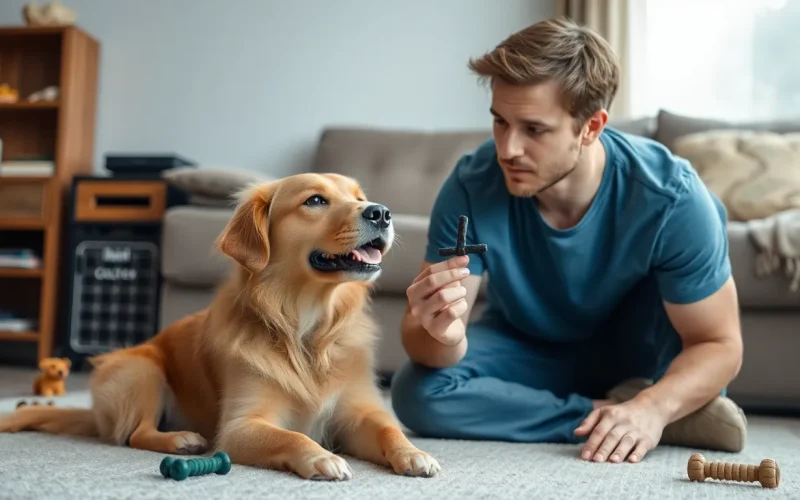Table of Contents
ToggleWhen it comes to sharing snacks with furry friends, the question often arises: can dogs have black licorice? While it might seem tempting to toss a piece their way, pet owners should tread carefully. After all, those adorable puppy eyes can be pretty convincing, but not all human treats are safe for canine consumption.
Black licorice, with its sweet and slightly bizarre flavor, might be a hit at your next movie night, but it can cause some serious trouble for dogs. So before you let them indulge in this chewy delight, it’s essential to explore the potential risks. Let’s dive into the world of black licorice and find out if it’s a treat worth sharing or a snack best left for humans.
Can Dogs Have Black Licorice?
Black licorice contains glycyrrhizin, a compound that can be harmful to dogs. Glycyrrhizin can lead to increased blood pressure and potassium depletion, creating serious health concerns. Dogs ingesting significant amounts may experience symptoms such as lethargy, vomiting, and even seizures.
Providing black licorice to dogs poses various risks. Some dogs may have allergies or intolerances that could trigger gastrointestinal upset. Veterinary experts often advise against offering sugary or sweet foods, which can contribute to obesity and dental problems.
While a small piece of black licorice may not cause immediate harm to a large dog, it’s crucial to consider their size and health status. Each dog reacts differently, and even small amounts can lead to adverse effects in sensitive individuals. Monitoring for unusual behaviors is key after they consume any human treats.
Instead of black licorice, opt for safer alternatives. Dehydrated sweet potatoes and peanut butter treats represent healthy options. These alternatives provide tasty snacks without the risks associated with human candies. Always consult with a veterinarian before introducing new foods to a dog’s diet.
Choosing treats that are specifically formulated for dogs ensures better health outcomes. Dog treats come designed to meet their nutritional needs while keeping them safe. Understanding dog-friendly options can lead to better choices and a happier pet.
Potential Risks of Black Licorice for Dogs

Black licorice contains several components that pose risks for dogs. Glycyrrhizin stands out as a primary toxic ingredient. This compound causes elevated blood pressure and reduces potassium levels in dogs, potentially leading to serious health issues.
Toxic Ingredients
Other harmful substances may lurk in black licorice. Anise flavoring can lead to gastrointestinal upset in some dogs. Additionally, artificial sweeteners like xylitol are especially dangerous. Even small amounts of xylitol can trigger low blood sugar, seizures, or liver failure in dogs. Owners should always check ingredient labels before sharing any human treats.
Health Implications
Ingesting black licorice can produce various health implications. Symptoms like lethargy, vomiting, and seizures may manifest after consumption. Additionally, stress on the body from elevated blood pressure can lead to heart issues over time. Monitoring for any unusual behavior following ingestion is crucial, as dogs respond differently. Avoiding black licorice helps prevent these severe health outcomes, ensuring a safer diet for pets.
Safe Alternatives to Black Licorice
Offering safe treats instead of black licorice ensures better health for pets. Several options exist that dogs enjoy without the risks associated with human candies.
Dog-Friendly Treats
Dog-friendly treats come in various flavors and textures, providing a delightful experience. Sweet potato chews offer natural sweetness and essential vitamins. Peanut butter treats are a favorite, delivering protein and flavor without harmful ingredients. Both options support dogs’ nutritional needs and avoid potential health issues. Always select products specifically designed for dogs to ensure safety and satisfaction.
Natural Snacks
Natural snacks made from wholesome ingredients can enhance a dog’s diet. Carrots provide crunch and nutrients while helping clean teeth. Apples, when cored and seeded, offer fiber and vitamins. Blueberries serve as bite-sized treats high in antioxidants. These choices not only satisfy dogs’ taste buds but also promote overall well-being. Always introduce new snacks gradually to observe for any adverse reactions.
What to Do If Your Dog Eats Black Licorice
If a dog consumes black licorice, swift action is essential to minimize risks. Identifying the amount ingested helps determine the next steps. Check for any immediate reactions, such as lethargy or vomiting. Keep the packaging to review ingredients. Clear any remaining licorice to prevent further consumption. Offer water to help dilute any toxins present in the system. Monitoring the dog’s behavior for several hours after ingestion is vital. Assessing their condition allows for better understanding of potential health effects.
Immediate Steps to Take
First, remove any remaining licorice to stop further ingestion. Next, observe the dog for signs of distress or unusual behavior. Common symptoms to monitor include weakness, vomiting, and diarrhea. Provide fresh water to keep the dog hydrated and flush out toxins. Avoid inducing vomiting unless directed by a veterinary professional. Contact a vet for specific advice based on the situation. Having relevant information like the amount eaten and time since ingestion helps during this conversation.
When to Contact a Vet
Contact a veterinarian if symptoms appear after your dog consumes black licorice. Signs of serious health issues include seizures, persistent vomiting, or unusual lethargy. Your vet may require details about the quantity ingested and any observed symptoms. Immediate veterinary care is crucial if the dog shows severe reactions or health deterioration. For peace of mind, contacting a veterinary expert as soon as possible proves beneficial. Always prioritize your dog’s well-being by staying informed about potential food hazards.
Sharing treats with dogs can be tempting but caution is key. Black licorice isn’t a safe option due to its harmful compounds and potential health risks. Instead of risking a pet’s well-being, pet owners should explore safer alternatives that provide enjoyment without the dangers associated with human snacks.
Choosing dog-friendly treats ensures pets receive the nutrients they need while avoiding serious health issues. Always consult a veterinarian before introducing new foods to a dog’s diet. Being informed about what’s safe for pets can lead to healthier choices and a happier, thriving companion.





